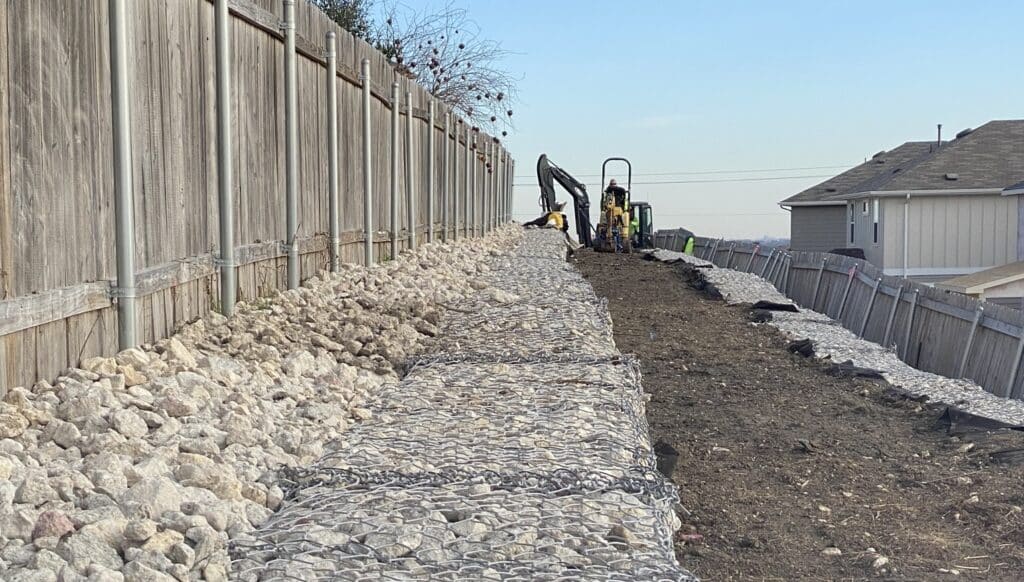6 Things Every Central Texas Developer Should Know

When it comes to new developments in Central Texas, erosion isn’t just an environmental issue—it’s a major construction risk. Without proper planning, erosion can lead to property damage, costly fines, and delays in final approval or reimbursement. For developers, contractors, HOAs, and MUDs, understanding how erosion control intersects with environmental regulations is critical for successful project delivery.
Why Erosion Is a Growing Concern in Central Texas
Central Texas is known for its highly variable weather, including long dry periods followed by intense, fast-moving storms. This creates ideal conditions for erosion, particularly on construction sites where the soil has been disturbed and vegetation is minimal. Sloped lots, exposed soils, and drainage paths all become high-risk zones for sediment runoff.
The region’s soil makeup—especially caliche and clay-rich subsoils—doesn’t absorb water well, compounding the problem. Instead of soaking into the ground, rainwater tends to run off quickly, carrying sediment with it. Without proper controls in place, this sediment can clog storm drains, pollute waterways, and destabilize foundations, culverts, and retention structures.
Regulatory Pressures: TCEQ and Local Ordinances
Erosion control isn’t optional—it’s the law. The Texas Commission on Environmental Quality (TCEQ) enforces strict guidelines through the Construction General Permit and associated Stormwater Pollution Prevention Plans (SWPPP). Developers disturbing one acre or more must have a SWPPP in place that includes specific erosion and sediment control strategies.
Local municipalities and Municipal Utility Districts (MUDs) also have their own standards, often requiring documentation, inspections, and permanent erosion control measures before a project can reach final acceptance. HOAs may be left with the burden of failed infrastructure if erosion control is not proactively managed during site development.
Real-World Risks and Consequences
Neglecting erosion control can have serious financial and operational consequences:
- TCEQ Violations: Noncompliance can result in daily fines up to $25,000, project shutdowns, and public citations.
- Infrastructure Damage: Erosion can weaken foundations, stormwater systems, and slope integrity.
- Drainage Failures: Sediment runoff often clogs drainage inlets, basins, and culverts, leading to localized flooding.
- Delayed Final Acceptance: MUDs and municipalities will not approve final acceptance of infrastructure if erosion is not addressed.
- Costly Rework: Developers may have to redo grading, install new erosion control systems, or replace damaged stormwater infrastructure.
Best Practices for Developers and Builders
At BPI Partners, we help Central Texas developers prevent these risks by designing and executing erosion control plans that are proactive, strategic, and TCEQ-compliant. Here are some of the practices we implement:
1. Phased Erosion Control Planning
Erosion control should begin during the pre-construction phase. We work with developers and civil engineers to ensure erosion is addressed in the early stages of project planning, not as an afterthought.
2. Stabilization of Exposed Soil
We use hydroseeding, hydromulching, and temporary seeding to protect bare soil from wind and water erosion. This provides temporary cover until permanent vegetation can be established.
3. Slope and Drainage Channel Protection
We install rock riprap, erosion control blankets, geotextiles, and check dams to stabilize slopes and slow water velocity in high-risk areas.
4. Sediment Containment Systems
Proper installation of silt fences, curb inlet protection, and sediment traps prevent soil from leaving the job site and entering public drainage systems.
5. Inspection and Maintenance Services
Our team performs routine inspections during and after rain events to assess site conditions, repair damaged BMPs (Best Management Practices), and make adjustments in real time.
6. Documentation for Regulatory Compliance
We provide the required documentation and reporting to ensure your project remains in compliance with TCEQ and municipal inspection requirements.
Erosion Control That Supports Final Acceptance and Reimbursement
For MUD and HOA projects in particular, erosion control ties directly to your project’s financial success. Improper controls can delay final reimbursement, put warranty periods at risk, and leave property managers with liabilities. Our team ensures that erosion control systems are installed to spec, inspected regularly, and properly transitioned to permanent stabilization before project turnover.
Partner With Central Texas Erosion Experts
Partner With Central Texas Erosion Experts
Whether you’re developing a residential subdivision, commercial property, or public infrastructure project, BPI Partners offers decades of experience managing erosion control in compliance with TCEQ and local municipalities. We provide full-service environmental construction support, from planning and permitting to field execution and long-term maintenance.
Call BPI Partners at (512) 288-5522 or visit bpipartners.com to learn how we can support your next project with reliable erosion control services.
